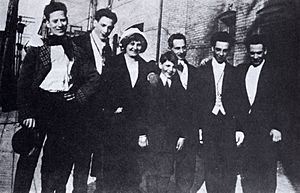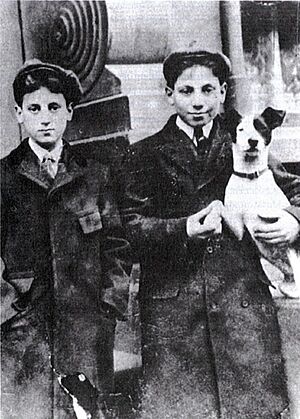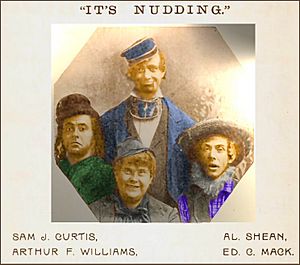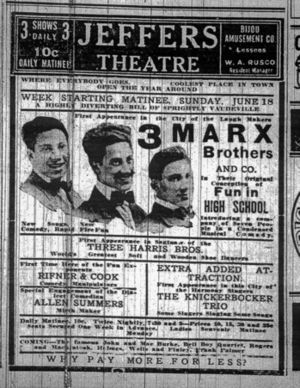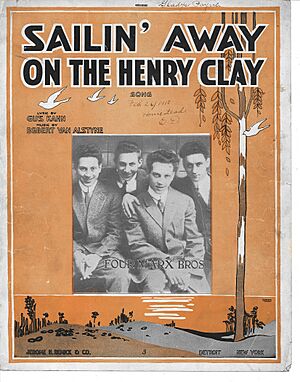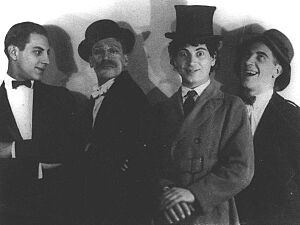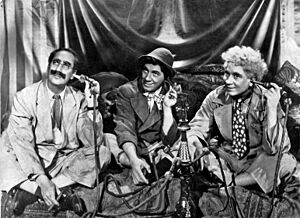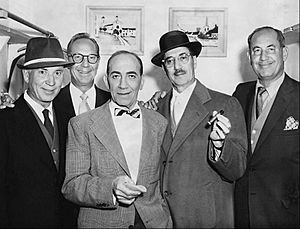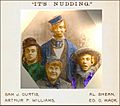Marx Brothers facts for kids
Quick facts for kids The Marx Brothers |
|
|---|---|
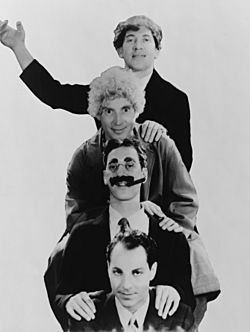
|
|
| Medium | Film, Broadway, vaudeville |
| Nationality | American |
| Years active | 1905–1949 |
| Genres | Word play, slapstick, musical comedy, deadpan |
| Notable works and roles | Duck Soup, A Night at the Opera |
| Former members | |
The Marx Brothers were an American family comedy group. They were very popular in vaudeville (a type of stage show), on Broadway (New York theater), and in movies. They performed from 1905 to 1949. Many people consider them among the greatest comedians of the 20th century.
Five of their thirteen movies were chosen by the American Film Institute (AFI) as top comedy films. Two of these, Duck Soup (1933) and A Night at the Opera (1935), are in the top fifteen. The brothers were also listed among the 25 greatest male stars of Hollywood cinema. They are the only group to be included together on this list.
The brothers are best known by their stage names: Chico, Harpo, Groucho, Gummo, and Zeppo. They also had an older brother, Manfred, who sadly died as a baby. Zeppo was given the middle name Manfred in his memory.
The main part of their act included the three older brothers: Chico, Harpo, and Groucho. Each of them created a very special stage character. After the group mostly stopped performing in 1950, Groucho had a successful career in television. Harpo and Chico appeared less often. The two younger brothers, Gummo and Zeppo, did not develop their stage characters as much. Both left the act to start successful business careers. For a while, they even ran a big theater agency. They represented their brothers and other performers. Gummo was not in any of the movies. Zeppo appeared in the first five films in serious, non-comedic roles. Their mother, Minnie Marx, helped them a lot in their early performing days. She was their manager until she passed away in 1929.
Contents
The Marx Family and Their Start
The Marx Brothers were born in New York City. Their parents were Jewish immigrants from Germany and France. Their mother, Minnie Schoenberg, was from Germany. She came from a family of performers. Her mother was a yodeling harpist, and her father was a ventriloquist. Both were entertainers at funfairs. Around 1880, Minnie's family moved to New York City. Minnie married Sam Marx in 1884.
Samuel Marx was from a small French village. He worked as a tailor and was nicknamed "Frenchy." The family lived in the Upper East Side of New York City. This area had many Irish, German, and Italian families.
The Marx Brothers also had an older cousin named Pauline, or "Polly." Minnie and Frenchy adopted her.
The brothers were born in this order:
- Leonard Joseph "Chico" Marx (born 1887)
- Adolph "Harpo" Marx (born 1888)
- Julius Henry "Groucho" Marx (born 1890)
- Milton "Gummo" Marx (born 1892)
- Herbert Manfred "Zeppo" Marx (born 1901)
Their family often talked about their firstborn son, Manny. He was born in 1886 but lived for only three months.
In the early 1900s, Minnie helped her younger brother, Abraham Schönberg (Al Shean), get into show business. He became very successful in vaudeville and on Broadway. This helped the Marx brothers get started in musical comedy and vaudeville. Minnie also managed her sons, using the name Minnie Palmer. This way, agents would not know she was their mother. All the brothers agreed that Minnie was the leader of the family. She was the one who pushed them to succeed. She was also known for being a tough negotiator with theater owners.
As their comedy act grew, it focused more on the characters of Chico, Harpo, and Groucho. This left less room for the younger brothers. Gummo and Zeppo both became successful businessmen. Gummo left the act early and found success with his talent agency. He also had a raincoat business. Zeppo stayed with the act through their Broadway years and early films. He then quit and became very wealthy with his engineering business.
Starting on Stage
The brothers came from a family of artists. Their musical talent was encouraged from a young age. Harpo was especially gifted. He learned to play many different instruments. He became a dedicated harpist, which gave him his nickname. Chico was an excellent pianist. Groucho played guitar and sang. Zeppo was a good singer.
They started in vaudeville, where their uncle Al Shean performed. Groucho first performed in 1905, mainly as a singer. By 1907, he and Gummo were singing together as "The Three Nightingales." The next year, Harpo joined them. By 1910, their mother Minnie and Aunt Hannah also joined briefly. The group was then called "The Six Mascots."
How Their Comedy Began
One night in 1912, a show in Nacogdoches, Texas, was interrupted. People outside were shouting about a runaway mule. The audience rushed out to see what was happening. Groucho was annoyed by this. When the audience returned, he made sarcastic comments about them. Instead of getting angry, the audience laughed. The family then realized they had potential as a comedy group.
Their act slowly changed from singing with some comedy to mostly comedy with music. The brothers performed a sketch called "Fun in Hi Skule." Groucho played a German-accented teacher. Harpo, Gummo, and Chico were his students. The last version of this school act was called Home Again. Their uncle Al Shean wrote it. The Home Again tour reached Flint, Michigan, in 1915. This was when 14-year-old Zeppo joined his four brothers. It is believed to be the only time all five Marx Brothers performed together on stage. Gummo then left to serve in World War I. He thought "anything is better than being an actor!" Zeppo replaced him for their last vaudeville years. He also joined them when they moved to Broadway and then to Paramount films.
During World War I, many people disliked Germans. The family tried to hide their German background. Their mother Minnie learned that farmers were not drafted for the war. So, she bought a 27-acre poultry farm in Illinois. But the brothers soon found they were not good at chicken farming. During this time, Groucho stopped using his "German" stage character.
By this time, "The Four Marx Brothers" started to use their unique comedy style. They also developed their famous characters. Both Groucho's and Harpo's memories say their stage characters were created by Al Shean. Groucho began to wear his famous painted mustache. He also used a stooped (bent-over) walk. Harpo stopped speaking on stage. He started wearing a red wig and carrying a taxi horn. Chico spoke with a fake Italian accent. He developed this accent off-stage to deal with tough kids in his neighborhood. Zeppo played the role of the serious, normal character.
The stage personalities of Groucho, Chico, and Harpo were based on their real personalities. Zeppo, however, was considered the funniest brother offstage. This was true even though he played serious roles. He was the youngest and had watched his brothers perform. So, he could fill in for any of them if they were sick.
By the 1920s, the Marx Brothers were one of America's favorite acts. They had a sharp and unusual sense of humor. They made fun of high society and people's fake behavior. They became famous for making up jokes on the spot. In one famous moment, Harpo chased a girl across the stage during Groucho's speech. Groucho just calmly said, "First time I ever saw a taxi hail a passenger.” When Harpo chased her back, Groucho looked at his watch. He then added, "The 9:20's right on time."
The brothers' vaudeville act made them stars on Broadway. Chico managed them, and Groucho directed their creative ideas. Their musical show I'll Say She Is (1924–1925) was a big hit. This success helped them work with famous playwright George S. Kaufman and songwriter Irving Berlin. They created the musical comedies The Cocoanuts (1925–1926) and Animal Crackers (1928–1929).
Without their costumes, the brothers looked quite similar. Zeppo could easily pass for a younger Groucho. He even played Groucho's son in Horse Feathers. In a scene from Duck Soup, Groucho, Harpo, and Chico all wear the same painted eyebrows, mustache, and round glasses. They look so much alike that they could perfectly perform the famous "mirror scene."
How Their Stage Names Started
A comedian named Art Fisher gave the brothers their stage names. This happened during a game in Galesburg, Illinois. The names were based on the brothers' personalities. They were also inspired by a popular comic strip character named "Groucho the Monk." As Fisher gave each brother a card, he called them by the names they used for the rest of their lives.
The reasons for Chico's and Harpo's names are clear. Gummo's name is also pretty well known. But Groucho's and Zeppo's names are less certain. Arthur was named Harpo because he played the harp. Leonard became Chico (pronounced "Chick-o") because he liked to chase girls, which was called "chicken chasing" back then.
Harpo wrote in his book that Milton became Gummo. This was because he moved around the theater quietly, like a detective (a "gumshoe"). Other stories say Gummo was often sick as a child. He wore rubber overshoes, called gumshoes, in all kinds of weather. Still others say Milton was the best dancer in the group. Dance shoes often had rubber soles. Groucho said the name came from Gummo wearing galoshes. So, the name is connected to rubber-soled shoes.
The reason Julius was named Groucho is the most debated. There are three main ideas:
- Julius's mood: Chico's daughter, Maxine, said that Julius was named "Groucho" because he was often grumpy. A director named Robert B. Weide, who knows a lot about the Marx Brothers, agreed this was the most likely reason. Later in his life, Groucho finally admitted that Fisher named him Groucho because he was the "moody one."
- The grouch bag: This idea appears in Harpo's book. Chico also mentioned it on TV. A "grouch bag" was a small bag worn around the neck. Travelers kept money and valuables in it to prevent theft. Many of Groucho's friends said he was very careful with money. This was especially true after he lost money in the 1929 stock market crash. So, naming him after the grouch bag might have been a joke about this trait. However, Groucho himself said this was not the case.
- Groucho's own explanation: Groucho said he was named after a character in a comic strip called Knocko the Monk. This strip started the trend of nicknames ending in "o." However, he is the only one who believed this. Most people don't take his claim seriously.
Groucho himself was not always clear about his name. At a concert, he said, "My name, of course, I never did understand." He also joked that he might have been named after his unemployed uncle Julius. His family thought this uncle was rich and hiding money. Groucho claimed they named him after the uncle to get into his will. "And he finally died, and he left us his will," Groucho said. "And in that will he left three razor blades, an 8-ball, a celluloid dicky, and he owed my father $85 beside."
Herbert was not nicknamed by Art Fisher. He joined the act after Gummo left. Like Groucho, there are three ideas for Herbert's name "Zeppo":
- Harpo's explanation: Harpo said the brothers named Herbert after Mr. Zippo. This was a chimpanzee in another performer's act. Herbert did not like this nickname. When he joined the act, he refused to be called "Zippo." So, the brothers agreed on "Zeppo."
- Chico's explanation: Chico's daughter Maxine said that when the brothers lived in Chicago, there was a popular type of joke. These were "Zeke and Zeb" jokes, which made fun of slow-witted Midwesterners. One day, Chico came home and saw Herbert sitting on the fence. Herbert said "Hi, Zeke!" Chico replied "Hi, Zeb!" and the name stuck. The brothers called him "Zeb." When he joined the act, they thought of "Zebbo," but chose "Zeppo."
- Groucho's explanation: Groucho said Zeppo was named because he was born when the first zeppelins (large airships) started crossing the ocean. Herbert was born in February 1901. The first zeppelin flew in July 1900. However, the first transatlantic zeppelin flight was not until 1924, much later than Herbert's birth.
Maxine Marx said that the brothers used their real names (Julius, Leonard, Adolph, Milton, and Herbert) on playbills. They only used their nicknames behind the scenes. This changed when a writer named Alexander Woollcott heard them using the nicknames. He asked why they used their real names publicly when they had such great nicknames. They said, "That wouldn't be dignified." Woollcott laughed loudly. This means they used their real names during their vaudeville days. Other stories say they used their nicknames in vaudeville. But they briefly used their real names for their first Broadway show. They worried a Broadway audience might think nicknames were not classy enough.
Movies and Later Years
Paramount Pictures
The Marx Brothers' stage shows became popular just as movies were starting to have sound ("talkies"). They signed a contract with Paramount Pictures. They began their film career at Paramount's studios in New York City. Their first two released films were based on their Broadway shows. These were The Cocoanuts (1929) and Animal Crackers (1930). Both were written by George S. Kaufman and Morrie Ryskind. Before these, they made a short silent film called Humor Risk, which was never released.
Production then moved to Hollywood. Their third full-length film, Monkey Business (1931), was their first movie not based on a stage show.
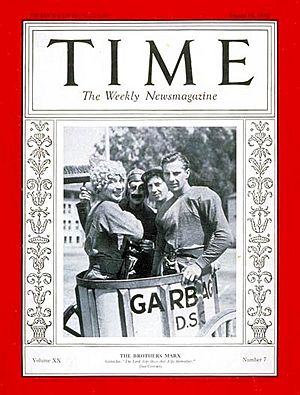
Horse Feathers (1932) made fun of American colleges and the Prohibition (when alcohol was illegal). It was their most popular film yet. It even got them on the cover of Time magazine.
During this time, Chico and Groucho also starred in a radio comedy series. It was called Flywheel, Shyster and Flywheel. The show was short-lived. But much of its material was used in later films. The scripts were thought to be lost. But copies were found in the Library of Congress in the 1980s.
Their last Paramount film was Duck Soup (1933). It was directed by the famous Leo McCarey. This film is the highest-rated Marx Brothers film on the American Film Institute's "100 years ... 100 Movies" list. It did not make as much money as Horse Feathers. But it was still the sixth-highest earning film of 1933. The film caused a funny argument between the Marxes and the village of Fredonia, New York. "Freedonia" was the name of a fictional country in the movie. The town leaders wrote to Paramount. They asked the studio to remove all mentions of Freedonia. They said it was "hurting our town's image." Groucho wrote back a sarcastic reply. He asked them to change the name of their town instead. He said, "it's hurting our picture."
MGM, RKO, and United Artists
After their contract with Paramount ended, Zeppo left the act. He became a talent agent. He and his brother Gummo built one of the biggest talent agencies in Hollywood. They worked with stars like Jack Benny and Lana Turner. Groucho and Chico did radio shows. There was talk of them returning to Broadway.
At a card game, Irving Thalberg talked with Chico. He suggested the Marxes join Metro-Goldwyn-Mayer (MGM) studios. They signed a contract. Now, they were billed as "Groucho, Chico, Harpo, Marx Bros."
Thalberg wanted their films to have a strong story. He wanted the brothers to be more likable characters. He mixed their comedy with romantic plots and musical numbers. Their jokes were aimed at clear villains. Thalberg also made sure the scripts had a "low point." This was where it seemed all hope was lost for the Marxes and the romantic characters. He started testing the film scripts with live audiences before filming. This helped them perfect the comedy timing. They kept jokes that got laughs and replaced those that did not. Thalberg also brought back Harpo's harp solos and Chico's piano solos. These had been left out of Duck Soup.
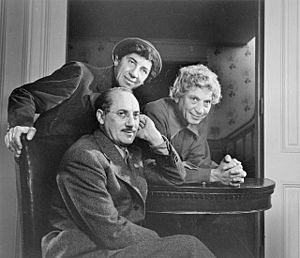
The first Marx Brothers film with Thalberg was A Night at the Opera (1935). It made fun of the world of opera. The brothers helped two young singers in love. They caused chaos during a performance of Il Trovatore. The film was a huge success. It included the famous scene where many people crowd into a tiny stateroom on a ship. Two years later, they had an even bigger hit, A Day at the Races (1937). In this film, the brothers cause trouble at a sanitarium and a horse race. It features Groucho and Chico's famous "Tootsie Frootsie Ice Cream" sketch. Groucho later said these two movies with Thalberg were their best. Despite their success, the brothers left MGM in 1937. Thalberg had died suddenly in 1936, leaving the Marxes without a strong supporter at the studio.
After a short time at RKO (Room Service, 1938), the Marx Brothers returned to MGM. They made three more films: At the Circus (1939), Go West (1940), and The Big Store (1941). Before The Big Store was released, they announced they were retiring from movies. However, four years later, Chico convinced his brothers to make two more films. These were A Night in Casablanca (1946) and Love Happy (1949). Chico needed money to pay off his financial difficulties. Both films were released by United Artists.
Later Years and Appearances
From the 1940s onwards, Chico and Harpo performed separately and together in nightclubs. Chico led a big band, the Chico Marx Orchestra. Groucho made many radio appearances. He also starred in You Bet Your Life, a popular game show. It ran from 1947 to 1961 on radio and television. He also wrote several books.
Groucho, Chico, and Harpo worked together in The Story of Mankind (1957). They appeared in separate scenes. In 1959, the three began a TV series called Deputy Seraph. Harpo and Chico played clumsy angels. Groucho played their boss every third episode. The project was stopped because Chico had health problems. He also had trouble remembering his lines. On March 8, 1959, Chico and Harpo starred as bumbling thieves. This was in The Incredible Jewel Robbery, an episode of General Electric Theater. Groucho made a short, uncredited appearance at the end. He said the only line of dialogue: "We won't talk until we see our lawyer!"
The five brothers made only one television appearance together. This was in 1957 on an early version of The Tonight Show. It was called Tonight! America After Dark.
Around 1960, director Billy Wilder thought about making a new Marx Brothers film. It was to be called A Day at the U.N. It would be a comedy about international secrets at the United Nations building. Wilder talked with Groucho and Gummo. But the project was put on hold because Harpo was ill. It was completely stopped when Chico died on October 11, 1961, at age 74. Three years later, Harpo died on September 28, 1964, at age 75. He had a heart attack after heart surgery.
In 1969, recordings of dialogue from their Paramount films were released on an album. It was called The Original Voice Tracks from Their Greatest Movies.
In 1970, the four Marx Brothers had a brief reunion in an animated TV special. It was called The Mad, Mad, Mad Comedians. The special showed animated versions of famous comedians' acts. Most comedians provided their own voices. But Paul Frees voiced Chico Marx and Zeppo Marx. The Marx Brothers' part was a scene from their Broadway play I'll Say She Is. It was a parody of Napoleon that Groucho thought was very funny.
Their Impact on Entertainment
On January 16, 1977, the Marx Brothers were honored. They were inducted into the Motion Picture Hall of Fame. Gummo passed away in April 1977. Groucho passed away in August 1977. Zeppo passed away in November 1979. The brothers were gone, but their influence on entertainment continues today. Many famous comedians have said the Marx Brothers influenced their style. These include Woody Allen, Mel Brooks, John Cleese, and Monty Python.
Film and TV References
- In Woody Allen's Take the Money and Run (1969), Virgil's parents wear Groucho masks.
- Annie Hall (1977) starts with a Groucho Marx joke.
- In Manhattan (1979), Woody Allen names the Marx Brothers as one of the things that make life worth living.
- In Everyone Says I Love You (1996), Woody Allen and Goldie Hawn dress as Groucho for a Marx Brothers celebration in France. The song "Hooray for Captain Spaulding" is performed.
- In the 1989 film Indiana Jones and the Last Crusade, Professor Henry Jones (Sean Connery) jokes about mailing his diary to the Marx Brothers.
- The 1992 film Brain Donors was inspired by the Marx Brothers films A Day at the Races and A Night at the Opera.
- In Rob Zombie's 2003 film House of 1000 C..., many characters are named after Marx Brothers characters.
Animation References
- The Marx Brothers have short appearances in Disney cartoons. These include The Bird Store (1932) and Mickey's Gala Premier (1932).
- Dopey in Snow White and the Seven Dwarfs was inspired by Harpo's silent performances.
- Bugs Bunny pretended to be Groucho Marx in the 1947 cartoon Slick Hare.
- Many TV shows like Animaniacs and Tiny Toons have featured Marx Brothers jokes.
- The Genie imitates the Marx Brothers in Aladdin and the King of Thieves.
Live-action Television References
- Harpo Marx appeared on a 1955 episode of I Love Lucy. He played his harp. He and Lucille Ball also re-created the famous mirror routine from Duck Soup. Lucy dressed up as Harpo.
- Hawkeye Pierce (Alan Alda) on M*A*S*H sometimes put on a fake nose and glasses. He would do a Groucho impression to entertain patients.
- In All in the Family, Rob Reiner often did Groucho impressions. Sally Struthers dressed as Harpo in one episode.
- Gabe Kaplan did many Groucho impressions on Welcome Back, Kotter.
Music References
- Rock band Queen named two of their albums after Marx Brothers films: A Night at the Opera (1975) and A Day at the Races (1976).
- Freddie Mercury sings "I ain't got no time for no Monkey Business" in his song "Living on My Own".
- The band Blind Guardian also named an album A Night at the Opera.
- Groucho Marx is on the cover of Alice Cooper's Greatest Hits.
- Harpo Marx is on the cover of The Kinks' album Everybody's in Show-Biz.
Literature References
- Jack Kerouac wrote a poem called To Harpo Marx.
- Ron Goulart wrote six books where Groucho Marx was a detective.
Advertising References
- In Vlasic Pickles commercials, the stork character holds a pickle. In a Groucho voice, he says, "Now that's the best tastin' pickle I ever heard!"
Filmography
Broadway stage:
- I'll Say She Is (1924–1925)
- The Cocoanuts (1925–1926)
- Animal Crackers (1928–1929)
Films with the four Marx Brothers:
- Humor Risk (1921), never released; film is lost
- The Cocoanuts (1929), based on a 1925 Broadway musical
- Animal Crackers (1930), based on a 1928 Broadway musical
- The House That Shadows Built (1931), features a scene with the Marx Brothers
- Monkey Business (1931)
- Horse Feathers (1932)
- Duck Soup (1933)
Films with the three Marx Brothers (after Zeppo left):
- A Night at the Opera (1935)
- A Day at the Races (1937)
- Room Service (1938), based on a play
- At the Circus (1939)
- Go West (1940)
- The Big Store (1941) (intended to be their last film)
- A Night in Casablanca (1946)
- Love Happy (1949)
- The Story of Mankind (1957), the three brothers appear in separate scenes
- The Incredible Jewel Robbery (1959), a TV episode starring Harpo and Chico with a cameo by Groucho
Solo projects:
- Groucho: Copacabana (1947), Mr. Music (1951), Double Dynamite (1951), A Girl in Every Port (1952), Will Success Spoil Rock Hunter? (1957) (uncredited), You Bet Your Life (TV show 1947–1961), Skidoo (1968).
- Harpo: Too Many Kisses (1925), Stage Door Canteen (1943) (cameo).
- Chico: Papa Romani (1950) (TV pilot), The College Bowl (TV show 1950–1951).
- Zeppo: A Kiss in the Dark (1925) (cameo).
Characters They Played
| Film | Year | Groucho | Chico | Harpo | Zeppo |
|---|---|---|---|---|---|
| The Cocoanuts | 1929 | Mr. Hammer | Chico | Harpo | Jamison |
| Animal Crackers | 1930 | Captain Geoffrey T. Spaulding | Signor Emmanuel Ravelli | The Professor | Horatio Jamison |
| Monkey Business | 1931 | Groucho | Chico | Harpo | Zeppo |
| Horse Feathers | 1932 | Professor Quincy Adams Wagstaff | Baravelli | Pinky | Frank Wagstaff |
| Duck Soup | 1933 | Rufus T. Firefly | Chicolini | Pinky | Lt. Bob Roland |
| A Night at the Opera | 1935 | Otis B. Driftwood | Fiorello | Tomasso | |
| A Day at the Races | 1937 | Dr. Hugo Z. Hackenbush | Tony | Stuffy | |
| Room Service | 1938 | Gordon Miller | Harry Binelli | Faker Englund | |
| At the Circus | 1939 | J. Cheever Loophole | Antonio Pirelli | Punchy | |
| Go West | 1940 | S. Quentin Quale | Joe Panello | Rusty Panello | |
| The Big Store | 1941 | Wolf J. Flywheel | Ravelli | Wacky | |
| A Night in Casablanca | 1946 | Ronald Kornblow | Corbaccio | Rusty | |
| Love Happy | 1949 | Sam Grunion | Faustino the Great | Harpo |
Awards and Honors
In 1974, at the Academy Awards, Jack Lemmon gave Groucho an honorary Academy Award. The audience gave him a standing ovation. This award was also for Harpo, Chico, and Zeppo. Groucho thanked the late Margaret Dumont, an actress who often performed with them. He called her a great "straight woman" who never understood his jokes.
The Marx Brothers were collectively ranked No. 20 on AFI's list of the Top 25 American male screen legends of Classic Hollywood. They are the only group to receive this honor.
The "Sweathogs" characters from the TV series Welcome Back Kotter copied much of their on-screen humor from the Marx Brothers. The show's star, Gabe Kaplan, was a big fan of the Marx Brothers.
The 1992 film Brain Donors was a tribute to the Marx Brothers' films, especially A Night at the Opera.
Images for kids
See also
 In Spanish: Hermanos Marx para niños
In Spanish: Hermanos Marx para niños


